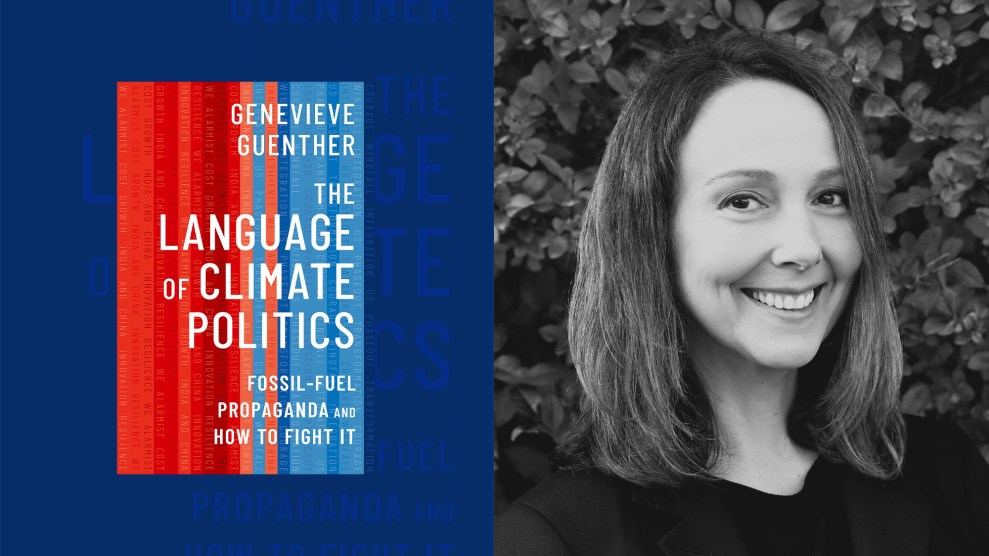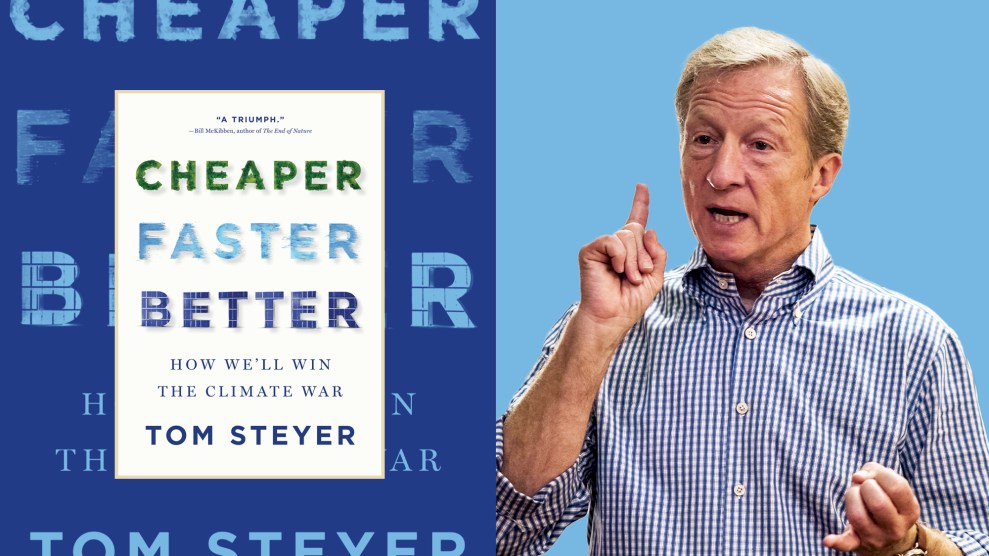
Mother Jones; Oxford University Press; Michael Halsband
This story was originally published by Grist and is reproduced here as part of the Climate Desk collaboration.
Talking about climate change doesn’t come naturally to most people, even those who are worried about it. Roughly two-thirds of Americans report discussing it with family and friends “rarely” or “never,” a survey found last fall. They might be intimidated by the science, nervous about starting an argument, or afraid of being a Debbie Downer. The resulting silence is part of why there’s not more social pressure to reduce fossil fuel emissions: People dramatically underestimate public support for climate policies, because that’s the cue they’re getting from those around them. The only way to break this cycle, communication experts have said for many years, is to please, please, start talking about it.
But a recently published book makes the case that not just any kind of talking is good; anything that resembles the phrasing of fossil fuel propaganda, even unwittingly, undermines what should be the central goal of reducing emissions. In The Language of Climate Politics, Genevieve Guenther, a former Renaissance scholar turned climate activist, writes that fossil fuel talking points have weaseled their way into becoming the “common-sense position,” espoused not just by the right, but also by the left.
Guenther founded the New York City-based volunteer group End Climate Silence in 2018, in the hopes of provoking the media into talking more about climate change. The common-sense philosophy behind her work is that words shape ideas, and ideas have consequences, so we should rethink the words we use. “To secure a livable future, one thing we will need to do is dismantle and reframe the terms dominating the language of climate politics,” Guenther writes.
“The book is positioned not so much as a guide to communication, but as a guide to taking a side in a battle of words: “One of the most powerful weapons you have is your voice.”
Her book lays out six key terms that she believes command the conversation, to the detriment of climate action: “alarmist,” “costs,” “growth,” “India and China,” “innovation,” and “resilience.”
These words are often used to prop up fossil fuels: by accusing people who speak out about the risks as overly alarmed, by pitting climate action against economic prosperity, by deflecting attention away from the US and onto other countries, and by protecting the status quo by pointing to carbon removal technologies and societies’ ability to bounce back. The book seeks to debunk these points of view, smartly documenting, for example, how economic models failed to account for the true costs of climate change for so long.
For each term, Guenther offers substitute arguments that “will be hard for fossil fuel interests to appropriate.” Don’t talk about “resilience,” she says, because it implies people can tough out extreme weather; talk about “transformation” instead. The result is a binary approach that suggests there is a right way and a wrong way to talk about the climate. This quest for black-and-white moral clarity risks antagonizing potential allies—such as the climate-concerned folks who think that carbon removal has promise or advocates who worry that a message could backfire if it sounds too scary, not to mention younger Republicans, two-thirds of whom favor prioritizing renewable energy over expanding fossil fuels. But that’s a risk Guenther is willing to take.
The opening chapter of The Language of Climate Politics scrutinizes the word “alarmist,” often used to accuse scientists of exaggerating dangers, in the service of embracing “alarmed,” which Guenther thinks is “a perfectly appropriate” response to the planet exiting the comfortable conditions that complex societies evolved in over the last 10,000 years. She criticizes the various factions within the climate discourse, from “lukewarmers” and “techno-optimists” who imagine a warmer future won’t be so bad, to “doomers” who imagine it’s too late to fix anything.
In the same spirit of putting people into boxes, Guenther’s critics might classify her as a “carbon reductionist” whose dogged focus on ending CO2 emissions elides the complex social and political factors behind weather disasters. In her view, anyone who questions those sounding the alarm, even a scientist who dislikes hyperbole, is overstepping. After the UN Secretary-General António Guterres proclaimed last year that the era of “global boiling” had arrived, NASA climate scientist Chris Colose criticized it as a “cringe” phrase that lets “bad faith people get an easy laugh.” Guenther condemns this critique as a distraction.
She acknowledges that her argument—“climate change will become catastrophic for everyone if the world does not phase out fossil fuels”—may not resonate broadly. “You may repel people who are generally disengaged from the climate crisis—not to mention centrist optimists—because it will be too much for them to take in at once. But that’s OK.” Her audience clearly isn’t the general public. To support this narrow focus, Guenther points to the “3.5 percent rule,” the idea that you only need to mobilize a small minority, 3.5 percent of a population, to force serious political change.
To make the “vast, swift system change now needed to head off collapse, we will need to take a pretty large swathe of the 99 percent with us,” wrote an Extinction Rebellion strategist.
The problem is that this number comes from political science research on how nonviolent campaigns can overthrow authoritarian governments, not campaigns seeking social change in democracies. It doesn’t necessarily translate to the process of implementing laws to reduce emissions over decades. The Harvard researcher behind the rule, Erica Chenoweth, has warned that aiming to mobilize 3.5 percent of a population without building wide public support is no guarantee of success. “It can be easy to conclude, I think wrongly, that all you need is 3.5 percent of the population on your side,” Chenoweth said on a podcast in 2022.
One climate activist group that was inspired by the 3.5 percent rule has since shifted away from the strategy. Extinction Rebellion drew the world’s attention in 2018 when its members in the United Kingdom began blockading bridges, supergluing their hands to government buildings, and pouring fake blood on the streets.
For years, critics within the organization warned that it was misusing the rule, potentially missing out on more effective strategies that would bring in the broader approval needed to enact climate policies. “To actually effect the kind of vast, swift system change now needed to head off collapse, we will need to take a pretty large swathe of the 99 percent with us,” wrote Rupert Read, a former XR strategist, in 2019.
Three years later, recognizing this need, Extinction Rebellion UK announced that it was shifting tactics from smashing windows to building bridges, “prioritizing attendance over arrest and relationships over roadblocks.” Since then, organizers say, support has grown and more people are becoming members.
Near the end of The Language of Climate Politics, in what could be read as a self-critique, Guenther gestures toward the need for a broad movement to force the US to move away from fossil fuels—one that includes Black communities fighting toxic pollution, young people worried about their future, and possibly even (gasp) climate tech entrepreneurs. The book as a whole, with its emphasis on reinforcing divisions, feels firmly placed in a time when social media has inflamed polarization, and a moment when a Democratic president has been in power for years.
Having a climate-friendly face like President Joe Biden in the White House tends to cause the environmental movement to splinter, with some groups focused on “insider” tactics, like lobbying Congress and crafting policies, and others focusing on “outsider” tactics, pushing for more ambitious change by protesting. By contrast, if former president and vigorous climate denier Donald Trump gets reelected this fall, even the vaguely climate-concerned could be mobilized for a revived “Resistance” movement, once again united by a common enemy.
What Guenther’s book gets right is that conversations about climate change have to be steered away from tired talking points toward new, productive ground. But the book is positioned not so much as a guide to communication, but as a guide to taking a side in a battle of words, with Guenther writing, “One of the most powerful weapons you have is your voice.”
Research shows that the hard work of persuasion, however, usually starts with listening to people with an empathetic, nonjudgmental ear, as opposed to debating them. It involves asking questions, building trust, and accepting that you’re not always right. Guenther eventually embraces this practical advice for approaching conversations with real people in a three-page afterword, and it seems to counter the strident tone of the nearly 200 pages that preceded it. That’s because there isn’t one right way to talk about climate change, but many.














